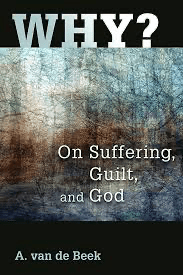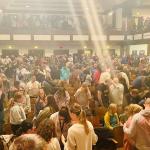“Why?” Chapter 20: “The Spirit Has Time”
This is a commentary on Chapter 20 of Abram van de Beek’s book “Why? Suffering, Guilt and God.” Some of my readers are reading the book with me and we are taking OUR time to discuss it chapter by chapter. The previous chapter, 19, was “Jesus Christ—God’s Choice” and brought us to a sort of climax of both answers and frustration about vdB’s view of God. We now know, for example, that for vdB, “Only now [in Jesus Christ] do people see who God has been from all eternity. Only now does it become clear who the Creator of the world is: Jesus Christ. Not only did it become known to humans; it also became known in God.” (294)
I can’t help reading that and similar statements through a mind that studied the theology of Wolfhart Pannenberg and studied it with him, listening to his lectures, reading his books, talking to him: “God does not yet exist.” But it SEEMS vdB is saying that BEFORE Jesus Christ who God is was not yet fully determined but that in Jesus Christ, God’s choice, the elect one of God, God determined himself for all eternity to have been and always to be the God of Jesus Christ. “In Jesus Christ God elects himself.” (294)
Time determining eternity. Instead of time being the moving image of eternity (traditional Greek-inspired Christian theism), eternity becomes the image of time or stamped by time, backwards and forwards. Becoming over being (Eberhard Juengel). But not process theology in which God is dependent on the world for his very being. VdB insists throughout that God is free.
Now we step into Chapter 20. Again, we come up against startling statements such as “In the depths of his being God can heave a sigh of relief. For he decided once and for all to be gracious in Christ.” (301) But overall the motif of this chapter is the Holy Spirit who now leads us forward and onward to the time of the eschaton and the fullness of God in Christ revealed to the world, the time of eternal life, of peace with God and of love. (295) But that time and the time before it, the “time between the times,” is no guaranteed blueprint already decided and worked out by God in all its ways. “The way of the Spirit, as realization and revelation of the way of God’s actions from creation to Christ, is not a straight line.” (301)
In this chapter we read hints of open theism (304) and Pannenberg (305). “No theologian can escape the fact that the deity of God is at stake and threatened in the world of the presents decade [1990s]….” I have labeled that “Pannenberg’s principle”—that God’s deity is dependent on his rule and that God’s deity is at stake in the eventual coming of his reign of peace and love.
On page 309 vdB writes sentences about why “things” are not all already pre-determined. Here is view of divine providence is completely compatible with Arminianism and not at all compatible with Calvinism!! “If human beings are being saved, they must be saved as human beings, as thinking, willing beings created by the breath of the Spirit. The salvation of humans occurs, not apart from humans but with their involvement, or else it is not the salvation of humans.” (309) Having read a lot of Dutch Reformed theology, I can say with some confidence that Arminianism has risen up within it and saved it from high Calvinism and I consider that a work of the Holy Spirit.
VdB answers anticipated objections to his theology. He is not afraid of anthropomorphism of God because the Bible anthropomorphizes God. There is no way to know about God or speak about God than in human-like terms (Juengel). The Bible does that and it is the narrative about God identifying himself to us (Hans Frei). Then, vdB admits to speculation, but says that all theology speculates. “Every theologian embarks on a road of speculation.” (314)
Finally, vdB tells us that his “design,” his “model of God,” “is an attempt to do justice to as many data as possible.” But “Scriptural data play a key role in that attempt precisely because of the decisive place of Jesus Christ.” (316) This reminds me of another favorite theologian vdB does not mention among his “collage”: Emil Brunner. Brunner, in his “Dogmatics,” insisted that we Christians ought not to believe in Jesus (as God and Savior) because of the Bible but rather to believe in the Bible because of Jesus who we meet in the Bible.
Next time, in about a week to ten days, I will take up Chapter 21: “Prayer and Argument.”
For now, let me tell you what I think of vdB and this book. I already said earlier: “courageous” and “bold.” I also said “maybe heretical.” But what I admire about vdB’s theology is that it is based solely and entirely on the biblical narrative with no allowance of philosophy to override that. Sure, he admits to standing on the shoulders, so to speak, of other theologians, but they also have tried to let the Bible speak for itself without philosophy having veto power.
For too, too long has philosophy pre-determined what theologians can think and say. Barth attempted to yank theology free of the shackles of philosophy. According to Hans Urs von Balthasar he was only partly successful (German idealism remaining to haunt Barth’s mature theology). Is vdB telling us what theology based solely on the Bible apart from any veto power over theology from philosophy looks like, especially with regard to the doctrine of God?
I think that philosophy can be useful in theology in “filling in the gaps,” but I have never been happy to allow philosophy to veto biblical theology with things like process thought (panentheism) and existentialism and analytical philosophy and the ontology of perfection (Plato and Aristotle).
*Note: If you choose to comment, make sure you read this chapter in “Why?” Otherwise, ask a question. In either case, keep it relatively brief (no more than about 100 words), on topic, addressed to me, civil and respectful (not hostile or argumentative), and devoid of pictures or links.*














